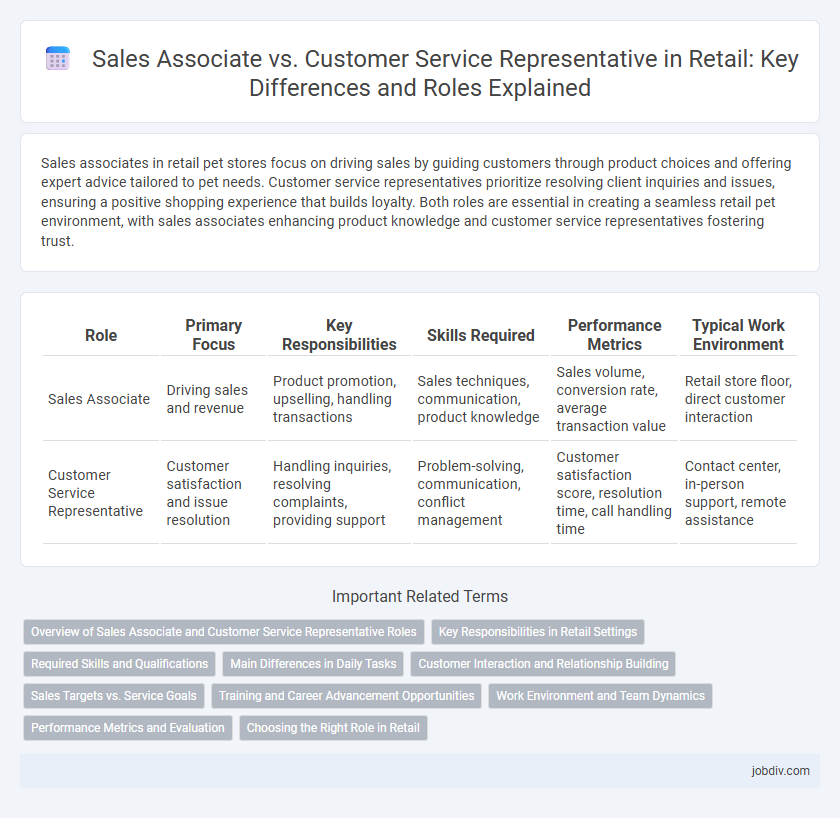Sales associates in retail pet stores focus on driving sales by guiding customers through product choices and offering expert advice tailored to pet needs. Customer service representatives prioritize resolving client inquiries and issues, ensuring a positive shopping experience that builds loyalty. Both roles are essential in creating a seamless retail pet environment, with sales associates enhancing product knowledge and customer service representatives fostering trust.
Table of Comparison
| Role | Primary Focus | Key Responsibilities | Skills Required | Performance Metrics | Typical Work Environment |
|---|---|---|---|---|---|
| Sales Associate | Driving sales and revenue | Product promotion, upselling, handling transactions | Sales techniques, communication, product knowledge | Sales volume, conversion rate, average transaction value | Retail store floor, direct customer interaction |
| Customer Service Representative | Customer satisfaction and issue resolution | Handling inquiries, resolving complaints, providing support | Problem-solving, communication, conflict management | Customer satisfaction score, resolution time, call handling time | Contact center, in-person support, remote assistance |
Overview of Sales Associate and Customer Service Representative Roles
Sales Associates primarily focus on driving in-store sales by assisting customers with product selection, maintaining merchandise displays, and processing transactions efficiently within retail environments. Customer Service Representatives handle inquiries, resolve complaints, and provide support across multiple channels such as phone, email, and live chat to ensure customer satisfaction and loyalty. Both roles are critical in delivering a seamless shopping experience by combining sales expertise with problem-solving and communication skills.
Key Responsibilities in Retail Settings
Sales Associates primarily drive in-store sales by engaging customers, recommending products, and maintaining merchandise displays to enhance the shopping experience. Customer Service Representatives handle post-purchase support, resolving inquiries, processing returns, and managing customer feedback to ensure satisfaction and loyalty. Both roles are crucial in retail settings for optimizing customer interactions and maximizing revenue through direct and indirect engagement.
Required Skills and Qualifications
Sales Associates require strong interpersonal skills, product knowledge, and the ability to handle transactions efficiently, often needing experience in merchandising and inventory management. Customer Service Representatives must excel in communication, problem-solving, and conflict resolution, with proficiency in CRM software and a customer-focused approach. Both roles demand teamwork, attention to detail, and adaptability within fast-paced retail environments.
Main Differences in Daily Tasks
Sales Associates primarily focus on assisting customers with product selection, processing transactions, and maintaining store displays to drive sales. Customer Service Representatives handle inquiries, resolve complaints, and provide post-purchase support through various channels like phone, email, or chat. The key difference lies in Sales Associates' emphasis on in-store sales activities, while Customer Service Representatives concentrate on enhancing customer satisfaction and retention through problem resolution.
Customer Interaction and Relationship Building
Sales Associates engage directly with customers on the retail floor, offering product knowledge and personalized recommendations to enhance the shopping experience. Customer Service Representatives handle post-purchase interactions, resolving issues and ensuring satisfaction through empathetic communication and problem-solving skills. Both roles are crucial for building strong customer relationships and driving loyalty by addressing needs promptly and effectively.
Sales Targets vs. Service Goals
Sales Associates primarily focus on achieving sales targets by promoting products and closing transactions to meet revenue goals. Customer Service Representatives prioritize service goals by resolving inquiries and enhancing customer satisfaction to build long-term loyalty. Both roles contribute to overall business success through complementary objectives in retail environments.
Training and Career Advancement Opportunities
Sales Associates receive hands-on training in product knowledge, sales techniques, and customer interaction, enhancing their ability to close transactions efficiently. Customer Service Representatives undergo specialized training in conflict resolution, communication skills, and problem-solving to effectively handle inquiries and complaints. Career advancement for Sales Associates often leads to supervisory roles or store management, while Customer Service Representatives can progress into specialized support roles or customer experience management positions.
Work Environment and Team Dynamics
Sales Associates often work on the retail floor, engaging directly with customers and collaborating closely with inventory and merchandising teams to enhance the shopping experience. Customer Service Representatives typically operate in call centers or back-office settings, coordinating with various departments to resolve customer issues efficiently. Both roles require strong communication skills and adaptability, but Sales Associates thrive in dynamic, face-to-face environments, while Customer Service Representatives excel in structured, process-driven team dynamics.
Performance Metrics and Evaluation
Sales Associates are primarily evaluated on sales performance metrics such as conversion rates, average transaction value, and upselling effectiveness, reflecting their direct impact on revenue generation. Customer Service Representatives are assessed using customer satisfaction scores, first contact resolution, and response time, highlighting their role in maintaining positive client relationships and service quality. Both roles require tracking key performance indicators (KPIs) aligned with business goals to optimize operational efficiency and customer experience.
Choosing the Right Role in Retail
Sales Associates excel in driving in-store purchases through product knowledge and personalized assistance, ideal for candidates who enjoy direct customer interaction and sales goals. Customer Service Representatives focus on resolving client inquiries and issues, often handling post-purchase support via phone or online channels, which suits individuals skilled in communication and problem-solving. Selecting the right role depends on your strengths in sales versus customer support and your preferred mode of customer engagement within the retail environment.
Sales Associate vs Customer Service Representative Infographic

 jobdiv.com
jobdiv.com